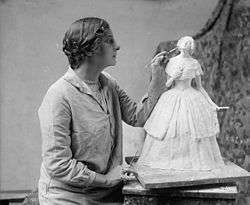Vicken von Post Totten

Hedvig Erika ("Vicken") von Post Börjeson Totten (March 12, 1886 – June 21, 1950) was a Swedish ceramicist, sculptor, painter, and illustrator.[1][2][3]
She studied at the Royal Swedish Academy of Arts with Gerhard Henning, known for his pieces produced by the Royal Danish Porcelain Factory.[4] She also studied in Paris.
She illustrated the first edition of Laura Fitinghoff's children's book The Kids from Frostmofjället (1907).[5] She worked for the Rörstrand Porcelain Factory from the summer of 1915 to 1921, where she modelled approximately thirty figurines that were put into production.[1]
She married sculptor Börje Börjeson in 1915, and separated from him in 1920.[2] In 1921, she traveled to the United States to participate in a Washington, D.C. exhibition,[2] met and married architect George Oakley Totten, Jr.[6]
Post Totten opened and operated an art school in Washington D.C. from 1921 to 1941.[7] She had an acclaimed exhibition at The Corcoran Gallery of Art in 1934.[2] She was a member of the National Association of Women Artists.[3]
Notable works include "Symbol of Flight" (1927), a bronze sculpture that was presented by the women of Washington, D.C. to Charles Lindbergh;[2] and eleven limestone bas-relief panels depicting the history of transportation (1932) modeled for the façade of the main post office in Waterbury, Connecticut, a building designed by her husband.[8] Several U.S. post offices contain W.P.A. art by Post Totten. Her plaster of Paris mural, "Pastoral of Spencer," was installed in the Spencer, West Virginia Post Office in 1938.[9][10]
Works by her are in the collections of the Metropolitan Museum of Art,[11] the Nationalmuseum in Stockholm, Sweden,[12] and other museums.
References
- 1 2 "Partage Plus, Featured Artists". Retrieved 2 November 2014.
- 1 2 3 4 5 "Vicken von Post 1886-1950 (translated from Swedish to English with Google Translate)". Retrieved 2 November 2014.
- 1 2 Glenn B. Opitz, ed., Mantle Fielding's Dictionary of American Painters, Sculptors & Engravers, Apollo Book, Poughkeepsie, NY, 1986, p. 944.
- ↑ Carl Laurin, Emil Hannover and Jens Thiis, Scandinavian Art, Benjamin Blom, New York, 1968, p. 221.
- ↑ Barnen ifrån Frostmofjället, from Projekt Runeberg.
- ↑ "MAJ. G.O. TOTTEN MARRIES: Weds Mrs. Vicken von Post, a Sculptress of Sweden," The New York Times, August 23, 1921, p. 11.
- ↑ Chris Petteys, Dictionary of Women Artists: An international dictionary of women artists born before 1900, G. K. Hall & Co., Boston, 1985, p. 703.
- ↑ Post Office Reliefs, from SIRIS.
- ↑ http://www.wpamurals.com/spencrwv.htm
- ↑ Marlene Park and Gerald E. Markowitz, Democratic Vistas: Post Offices and Public Art in the New Deal, Temple University Press, Philadelphia, 1984, p. 323.
- ↑ The Secret, from Metropolitan Museum of Art.
- ↑ Vicken von Post, from Nationalmuseum.